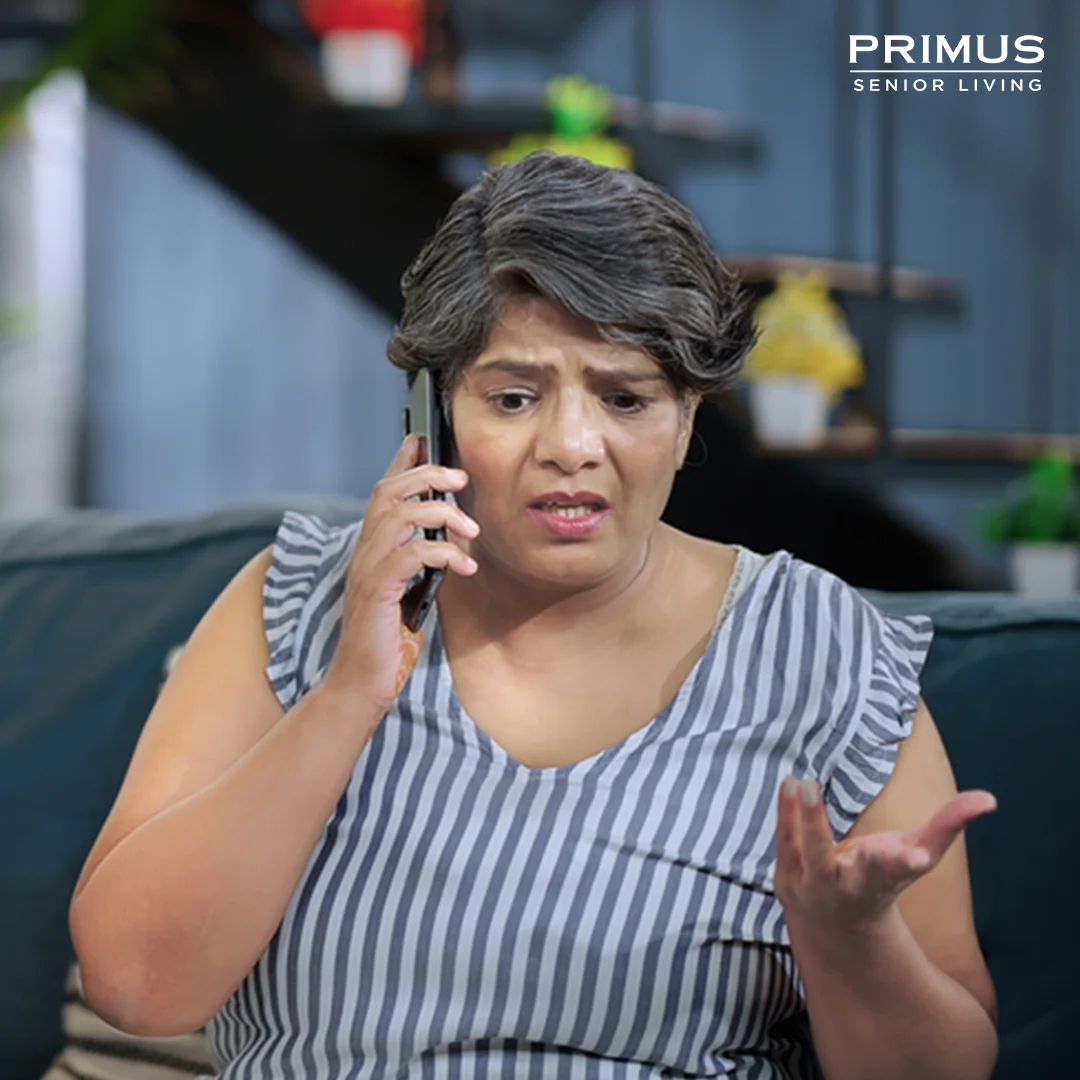When we’re taking care of seniors, we're often left wondering whether we're doing enough for them or about how to make their lives easier and better. Caring for elders takes more specialised care and resources that not every family can provide. As we think about the various senior citizen homes out there, one important thing to note is that physical well-being is not the only factor to be considered. As they age, seniors are prone to loneliness and mental deterioration and often require additional support, whether it’s help with mobility, healthcare, or simply companionship. The question that constantly lingers in the minds of caregivers and family members is: whom to contact when worried about an elderly person?
A mix of medical help, emotional support, and home safety precautions are needed to safeguard their well-being. In order to avoid chronic medical issues, non-emergency circumstances also require care, even when current emergencies call for prompt intervention. This guide will help you navigate the different aspects of elderly care, providing a structured approach to addressing concerns and finding the right resources.
Understanding The Scope Of Elderly Care
Caring for seniors extends far beyond basic physical health. It encompasses mental well-being, social connections, and quality of life considerations. As our elderly population grows, with India's over-60 population standing at a staggering 156.7 million—and the number projected to skyrocket to an estimated 346 million by 2050 (sourced from JLL)—understanding whom to contact when worried about an elderly person becomes non-negotiable for both family caregivers and community members in order to make timely decisions and the right ones for your senior.
Common Concerns Regarding Physical Health and Safety Needs
Creating a secure and easily accessible living space is the first concern when it comes to senior care. In order to preserve their independence, many older people who have mobility problems need house adaptations. Here’s what you should consider:
-
Prescription drugs, mobility aids like wheelchairs and walkers, and necessities for everyday life should all be easily accessible.
-
Fall prevention measures for your home include anti-slip flooring, handrails, and grab bars in commonly used areas like stairwells and bathrooms. Ramps and raised garden beds are also great adaptations for people with limited mobility.
-
Exercise and extracurricular activities are pertinent for avoiding a sedentary lifestyle. Seniors need to stay active and involved by participating in mild physical activities like yoga, walking, or physical therapy.
-
Seniors need community experience to stay socially engaged. Group activities, senior centres, and community events improve social connection and help with overall well-being.
Common Concerns Regarding Mental Health and Emotional Well-Being
Along with physical restrictions, ageing also presents emotional difficulties in seniors. Loneliness, sadness, and cognitive deterioration are common among the elderly. In the context of senior care, mental health is equally as important as physical health. Take note of the following points to be considered about regulating mental and emotional well-being in seniors:
- Social interaction through regular engagement with family, friends, or senior communities can change the hormonal systems and keep the senior happy and content.
- Cognitive stimulation with activities such as reading, puzzles, music therapy, and memory games helps keep the mind sharp and focused.
- Therapists or senior support groups can provide emotional stability and guidance for seniors looking for a community.
At Primus Senior Living, we incorporate all the elements mentioned above, as well as additional features like reflexology walkways and art workshops to stimulate mental activity in seniors. To learn more about the services we offer, along with specialized care and medical attention, visit our website.
Now that we’ve covered the key concerns let’s discuss whom to contact when worried about an elderly person based on the situation.
Whom To Contact When Worried About An Elderly Person?
Different resources can be contacted to offer immediate or continuing assistance, depending on whether the situation is an emergency or not.
Immediate Threat or Emergency Situation:
Dial 102 for emergency ambulance services or 100 for police aid if the elderly person is in imminent danger or is having a medical emergency. It's critical to take prompt action in cases of:
- Severe injuries or falls
- Heart attack, stroke, or breathing difficulties
- Physical abuse or neglect situations
Additionally, you can reach out to:
- Elder Line (National Helpline for Senior Citizens): Call 14567 for emergency interventions, abuse reporting, guidance, and emotional support for the elderly.
- Private healthcare providers offer personal ambulance services, guaranteeing a senior-specific emergency response around the clock.
Non-Emergency Situations:
If you are worried about the senior's health, safety, or living conditions but there isn't an immediate threat, get in touch with:
-
Support groups for senior citizens that offer assistance and check-ins through regional NGOs and government initiatives.
-
Professionals in geriatric care who evaluate mental and physical health issues and provide appropriate treatments.
-
Home health care providers are responsible for treatment, administration of medications, and regular checkups.
Ongoing Mental Health Concerns
If a senior citizen experiences depression, loneliness, or cognitive decline, get in touch with:
-
Senior mental health hotlines that provide counselling or therapy.
-
Experts in memory care for issues relating to dementia or Alzheimer's.
-
Social workers or community centres that help reintegrate seniors into social activities.
How to Practice Safe Care at Home?
With the right house modifications and care techniques, ageing in place can be made safe and comfortable. Following are some doable strategies to guarantee senior well-being and safety at home:
Modifications to the home: Reducing possible risks and encouraging mobility require alterations to the existing home environment. This could entail wider entrances to provide room for mobility aids, building ramps for simple wheelchair or walker access, adding grab bars to restrooms and showers for extra stability, and upgrading lighting to reduce the risk of falls.
Medication management: It's critical to manage medications safely and accurately. Creating a prescription plan, presorting dosages using pill organisers, and routinely reviewing drugs with a healthcare provider to spot possible interactions or adverse effects are all essential habits.
Nutritious diet: When preparing meals, it's important to take into account each person's unique nutritional requirements, including any limitations imposed by diabetes, heart disease, or other illnesses. Make an effort to supply a range of foods high in nutrients, including whole grains, fruits, veggies, and lean meats. To guarantee proper hydration, promote consistent fluid consumption. For individualised nutritional advice, speak with a licensed nutritionist if required.
Emotional support: The state of one's emotions is equally as vital as their physical health. Companionship, attentive listening to worries, and creating a kind and encouraging environment are vital parts of the process. Address any feelings of isolation or loneliness, promote involvement in pastimes and activities, and have meaningful interactions Making people feel like they belong and have a purpose can greatly improve their quality of life.
Support Services and Other Resources
Professional caretakers and specialised senior living communities offer structured support to families looking for all-inclusive senior care options.
Professional caretakers: Qualified professional caretakers can offer priceless support with a variety of duties, such as medicine reminders, meal preparation, light cleaning, companionship, and personal care (bathing, dressing, and grooming). There are varying degrees of care provided, ranging from sporadic visits to round-the-clock assistance.
Live-in care: Live-in care gives families comfort by offering round-the-clock support and supervision, as well as ongoing care for people with complex needs. All facets of everyday life, such as personal care, medication administration, meal preparation, and housework, can be helped by live-in caretakers. Those who need round-the-clock care or have restricted mobility are particularly likely to benefit from this choice.
Senior centres and community programs: These organisations provide a range of services and events aimed at encouraging social interaction, leisure, and education. Such programs can give seniors the chance to socialise, take part in fitness classes, engage in hobbies, and have access to helpful resources and support services, improving general well-being and fighting social isolation.
Respite care: This type of care gives family members short-term relief so they can take a break from their duties. Respite care can be given in a residential institution, an adult daycare centre, or the patient's home, and it can last anywhere from a few hours to several days. The long-term viability of home care arrangements and the prevention of carer burnout depend on the use of respite care.
Primus Senior Living: A New Age Approach to Elderly Care
Senior care at Primus Senior Living promotes a happy, independent, and safe atmosphere in addition to providing support. At our community-focused space:
-
Seniors, especially those with cognitive impairments, can find a peaceful setting in therapeutic and memory gardens.
-
Anti-skid flooring, grab bars, and navigational signals are all features of the barrier-free architecture that guarantee simple mobility and safety.
Not only do we offer care at Primus Senior Living, but we also create an environment where elders can flourish in a safe and satisfying setting. To learn more about our services, visit our website.
The Bottom Line
Senior care encompasses not just physical health but also emotional, social, and psychological well-being. With so many support networks accessible today, families can make sure their senior loved ones stay secure, content, and well by selecting the appropriate combination of resources. To guarantee appropriate care and support, it is essential to know whom to contact when worried about an elderly person. Understanding the available resources and creating a thorough support system can help us better meet the demands of our ageing population while preserving their freedom and dignity.
A proactive approach yields better planning and prevents rushed decision-making during emergencies. Keep in mind that every senior's circumstances are different, and care plans have to be customised to meet their requirements and preferences. And planning ahead gives seniors and their families enough time to consider the best resources that regulate a better health span and well-being in the years to come. Whether through home modifications, professional caregivers, or senior living communities like Primus Senior Living, the key is to prioritise their well-being while respecting their independence.
If you're looking for the best senior care options, explore Primus Senior Living and discover how we can help create a nurturing, secure space for your loved ones.
Frequently Asked Questions
1. Whom to contact when worried about an elderly person in an emergency?
If an elderly person is in immediate danger or experiencing a medical emergency, you should dial 102 for ambulance services or 100 for police assistance. Additionally, the Elder Line (14567) is available for emergency interventions, reporting abuse, and providing guidance and emotional support for seniors.
2. Who should I contact for non-emergency concerns about an elderly person’s health and well-being?
For non-emergency concerns, you can reach out to geriatric care professionals who assess both physical and mental health issues in seniors, home health care providers who offer regular health check-ups, medication management, and personal care and support groups, helping them stay engaged and connected to the community.
3. How can I get help for ongoing mental health concerns in seniors?
For ongoing mental health issues such as depression, loneliness, or cognitive decline, consider contacting mental health hotlines, memory care specialists, and/or community social workers. Additionally, senior living communities like Primus Senior Living incorporate cognitive stimulation activities such as art workshops, music therapy, and reflexology walkways to improve mental health and emotional well-being.
4. What are some safety measures to care for an elderly person at home?
To ensure the safety and well-being of seniors at home, consider making modifications to your home, such as installing anti-slip flooring, grab bars, and mobility aids; using pill organisers for managing medication; and signing up for social groups that encourage participation in hobbies, group activities, or community events to promote emotional well-being.
5. What senior care options are available if home care isn’t sufficient?
If home care is no longer feasible, several structured senior care options are available, ranging from professional caregivers, live-in care systems, senior living communities, and respite care for short-term care.
You may also like

Frequently Asked Questions About Health And Food For Seniors
While the pandemic has brought about the conversation about health and wellness to our dinner tables now, it has been a question for seniors and their caretakers. We have tried to answer a few of your queries about senior health and diet in these questions!
READ MORE
Ways To Avoid Depression In Seniors
Despite depression being common in older adults, it isn't normal. Seniors with the mental disorder stand the chance of increased risks of cardiac diseases, heart attacks and other illnesses. The symptoms of depression in seniors may not be the same as the ones seen in younger people. When depressed, the symptoms can affect the way they think, feel and engage in daily activities. Seniors can also appear to be tired, have trouble sleeping or seem grumpy or irritable. In some cases, depression can also cause them physical pain which cannot be attributed to any other health condition.
READ MORE

Leave a Comment